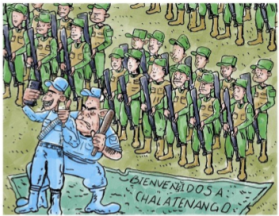FMLN Holds Successful National Convention; Prepares for 15th Anniversary of Peace Accords
The year 2006 endedwith the FMLN celebrating its 12th National Convention, wherechanges to party statutes were approved by almost 500 participants. The conventions focus was on discussion ofstrategy and internal changes that aim at unifying and strengthening the party forthe next two years leading up to the major 2009 elections. The FMLN also used the convention to call forreflection on the advances and problems with the implementation of the PeaceAccords.
At the December 17thconvention, FMLN General Coordinator Medardo Gonzalez called for theconstruction of a "Common Front" that will bring together all the social andcivil society actors. The call for unitywas also extended to the sectors not historically or currently part of theSalvadoran left but that have been affected by ARENAs neoliberal model imposedon El Salvadorsuch as CAFTA.
The main reforms thatwere approved relate to the partys structure and internal functioning: therewill now be separate classification for FMLN "affiliates" and "militants"; theformat for internal election changed to a process of proposals and ratificationrather than always having secret elections between a number of candidates; andthe convention voted to keep the current leadership of the FMLN in power until afterthe 2009 elections. The reforms to thestatutes had been consulted with the base committees in all the departmentsprevious to the convention, leading to a nearly unanimous consensus in approvalof the reforms.
Late Night Final Legislative Session of theYear Passes Anti-Organized Crime Law
ARENAconcluded 2006 with one more piece of legislation aimed at criminalizingorganizing while pretending to address the issue of increasing crime. Late in the night on December 20 just daysafter the U.S. Ambassador asked the legislature to do so ARENA and two smallerrightwing parties approved the "Anti-Organized Crime" Law. The FMLN did not support the law because ofits repressive nature towards the social movement and its potential to beapplied arbitrarily.
Officially,the law allows for there to be "legal tools" to punish and halt organizedcrime, specifically the creation of new specialized tribunals. However, it has been widely criticized sinceit labels gangs "organized crime" and, like Mano Dura ("Iron Fist") and otherpast failed anti-crime policies, makes gangs out to the be the main source ofcrime and violence in El Salvador. Yeteven official statistics prove that gang activity is not the main cause ofcrime in El Salvador. The numbers coming out at the end of 2006show the continued failure of the government to curb crime: there was a 3.36% increasein the homicide rate from 2005, and overcrowded prisons now hold almost 15,000prisoners, more than double their capacity. There was an increase of 2,500 people incarcerated last year, many ofwhom do not even have charges against them.
2007 Declared the Year of "Peace"
January 16 will be the 15th anniversary of the signing of the1992 Peace Accords. Although the rightwing has rarely celebrated the Peace Accords, Saca has declared the year 2007the "Year of Peace." Additionally, forthe first time in years, there will be an official celebration of the signingof the Peace Accords on the 13th of January. The celebration has caused debate as towhether or not peace can be celebrated, with violence steadily increasing. Meanwhile, the social and economic causes ofviolence are also getting worse, especially with the implementation of CAFTAand as the ARENA government moves forward with the neoliberal agenda. The FMLN is celebrating the anniversary bycommemorating the life and death of the historic leader Schafik Handal. The FMLN will also use the anniversary as a spacefor evaluating the fulfillment of the Accords.
Currently, the FMLN and the social movement are preparing for the Foro deSao Paulo, an organization founded in 1990 by the Labor Party of Brazil afterthe fall of the Berlin Wall to discuss the consequences of the application ofthe neoliberal model in the region. TheForo will be held from the 12th-15th of January in SanSalvador, where leftist parties and social and popular organizations of LatinAmerica, Caribbean and other parts of the world will gather to discuss theadvances of the Left in Latin America. Nidia Diaz, FMLN deputy in the CentralAmerican Parliament and one of the organizers of the Forum, says thatdiscussions will focus on the current struggle for the integration of thepeoples movement throughout Latin America and the Caribbean.

 "I am a CISPES supporter because continuing to fight for social justice and a more people-centered country means continuing the dream and sacrifice of thousands of my fellow Salvadorans who died for that vision.” - Padre Carlos, New York City
"I am a CISPES supporter because continuing to fight for social justice and a more people-centered country means continuing the dream and sacrifice of thousands of my fellow Salvadorans who died for that vision.” - Padre Carlos, New York City

